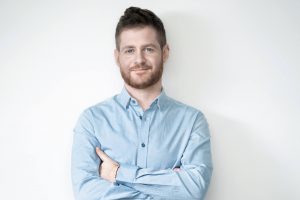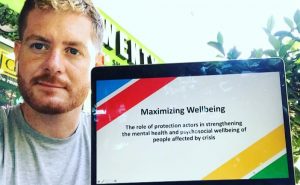AFE Reflections from Roei Shaul Hillel, MHPSS Specialist at UNICEF:
Background
The past year brought many uncertainties and adventures with it. As I have learned in the past year that I would not be able to attend the Duke-UNC Center in person, I studied remotely while working as a social worker in Bosnia and Herzegovina.
This was definitely not how I thought I would spend the first year of the Rotary Peace Fellowship which I passionately waited for, but I am happy for the people and opportunities I have met along the way. It has been a year full of self-observation, understanding more and more what role I want to have within the world of social work and huma nitarian aid, what is important for me as an individual and how my identities fit in this whole plan.
nitarian aid, what is important for me as an individual and how my identities fit in this whole plan.
When our cohort began to search for internships, I realized that I have an incredible opportunity to learn how humanitarian aid works behind the scenes. Having worked as a social worker for several years, I became more and more interested in the intersection of humanitarian aid, mental health and psychosocial support (MHPSS) and accessibility of services. I spent weeks sending messages via LinkedIn to MHPSS professionals working in the field, until one very kind person agreed to let me explore together opportunities for action.
Child Protection, MHPSS and UNICEF
Since March, I am interning at UNICEF, at the Child Protection Area of Responsibility, functioning as an MHPSS specialist focusing on Childhood Sexual Abuse (CSA) and provision of MHPSS services to children and adolescents, mainly LGBTQIA+ individuals.
The Child Protection Area of Responsibility (CP AoR) is specifically focused on enhancing child protection coordination and response in humanitarian contexts. We support field child protection coordination groups and national and international child protection actors, ensuring that efforts to protect children are well coordinated and achieve maximum quality and impact. The department of mental health and psychosocial support (MHPSS) integrates interventions that individuals, groups and communities receive to care for or enhance their mental health and psychosocial wellbeing. MHPSS departments have been established across the globe, often cooperating together with local mental health agencies, promoting both short and long-term interventions to alleviate emotional suffering.
How is it going?
Entering this field in this context has been, and still is, eye opening for me. Most of my experience comes from the field, either in local welfare services or international humanitarian missions, but never behind the scenes. As the CP AoR sits under the Global Protection Cluster – the UN’s system for coping with humanitarian emergencies – in the past several months I experienced talking to passionate and brilliant professionals from all sectors that are related to child protection: nutrition, health, hygiene, shelter, as well as mental health professionals, human rights advocates and diplomats. The gap between the world of ‘program development’ and the field is crystal clear, but I feel that the people I work with have their hearts integrated in the right places. Self-reflection is evident on a daily basis – where does humanitarian work cross a line? When do we do more harm than good? Where do we enhance the community’s capacities and when do we maintain a status quo of receiving aid? I learnt that there is more than one way to answer these questions, and that through asking these questions, bodies such as the UN keep improving.
What do I do?
 I feel lucky for being positioned where I am. I get to meet experts in the field of trauma, provision of MHPSS services and coordinating humanitarian emergencies, and bring my own experience from the field into practice. My main focus is on the provision of MHPSS services to LGBTQIA+ adolescents who cope with sexual trauma and currently are displaced.
I feel lucky for being positioned where I am. I get to meet experts in the field of trauma, provision of MHPSS services and coordinating humanitarian emergencies, and bring my own experience from the field into practice. My main focus is on the provision of MHPSS services to LGBTQIA+ adolescents who cope with sexual trauma and currently are displaced.
The world of MHPSS programs acknowledge the importance of CSA (childhood sexual abuse) and its unique nature in the humanitarian arena. Many times children are commercially exploited or are coerced or forced to take part in sexual activities such as forced marriage, escort agencies and prostitution. This kind of CSA can have traumatizing impacts on the victims and their communities which range from emotional, psychological, physical, and social effects.
I get the chance to deliver trainings to non-MHPSS professionals, conduct research on best methods, create guidelines for LGBTQIA+-friendly services in emergencies and develop curriculums for community programs that will be integrated in refugee camps in Bangladesh, Lesbos and Libya. We also coordinate programs to improve intersectoral work within the work of child protection, to ensure that services will be as inclusive and comprehensive as possible. The work itself requires patience and forces me to be humble while facing complexities that I just do not know how to handle. The UN has its own language and rules, and sometimes I sit in front of Zoom feeling like an imposter. However, this work is challenging and diverse and requires me to always think about the quality of the services provided, while looking at the current political situations in those areas.
When it meets life
I am currently based in Tel Aviv for the summer, my hometown. During the past year at UNC and Duke, I realized that I cannot ‘run away’ from my identity as an Israeli within the field of conflict resolution and humanitarian work. Going through courses that talk about peace demanded me to think critically about where I am coming from. Coming back in May, I was lucky to be with my family and friends during the last events in Palestine and Israel. One of the most challenging aspects for me was to conduct research on the number of children and adolescents in need of MHPSS services in Gaza after recent bombings.
Conducting this research and creating policy papers while violence escalated within Israel, I had to detach my own current experiences from the work I am doing. It was the first time I was exposed to the world of MHPSS in my own region, while an active war is going on and impacting my close surroundings. I see the importance of the work that we do, in enabling quality mental health services to children and adolescents who are most in need, and experience the complexity of bringing my own identity, experience and attachments into the field of humanitarian aid.
What’s next?
My internship is still ongoing, however the summer is coming to an end. In a month from now I will be departing to the US, to continue studying for a Master of Social Work and focus on provision of psychosocial support to children and adolescent coping with mental health issues. I cherish the opportunity I receive with UNICEF to think broadly about the intersection of MHPSS, psychotherapy, UN, politics and identity.
I feel as if I am in the midst of a personal process, understanding where do I personally fit in within this world. What do I want to do as a social worker? What are the advantages and challenges of working in such powerful international organizations? How can we make sure that we support the idea of localization, respect and dignity, while working in the field of humanitarian work?
I am looking forward to the next two months of my internship where I will focus mainly on creating practical guidelines for organizations to work with CSA survivors within the LGBTQIA+ community. I hope that those questions that I am asking will lead me throughout this process, and will result in individuals and communities receiving quality, respectful and professional services, as we all deserve.